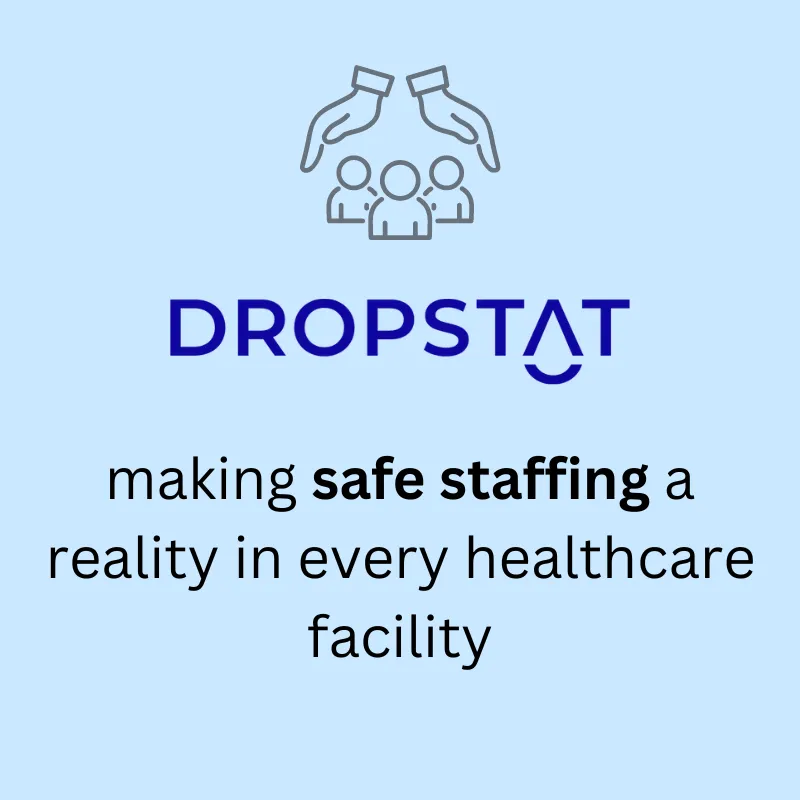What is self-care for nurses?
Self-care is a vital concept that encompasses activities and practices that individuals engage in to promote their well-being and maintain their physical, psychological, emotional, social, and spiritual health. In nursing, self-care refers to the intentional actions nurses take to nurture and care for themselves, ensuring they can provide the best possible care to their patients.
The WHO (World Health Organization) defines the coping skill of “self-care” as a person’s ability to stay healthy with or without the support of a healthcare provider while maintaining healthiness and preventing disease. A scoping review in Healthcare identifies that nurse self-care is related to practicing 3 constructs:
- mindfulness,
- compassion, and
- resilience.
Why is self-care important for nurses?
The connection between self-care and nursing performance is deep. When staff engage in practicing the general self-care nursing theory, they feel better about themselves, and employee wellbeing influences the wider environment. They experience enhanced job satisfaction, reduced absenteeism, and decreased burnout rates. These positive outcomes directly translate into improved patient care and satisfaction.
Nurses who practice self-care are better equipped to handle the demands and challenges of their profession, leading to more compassionate and effective care delivery.
Nurse self-care theory is emerging as a framework that emphasizes the importance of self-care in nursing. It underscores the need for nurses to prioritize self-care in nursing as a means of maintaining their physical and emotional health, enabling them to thrive.
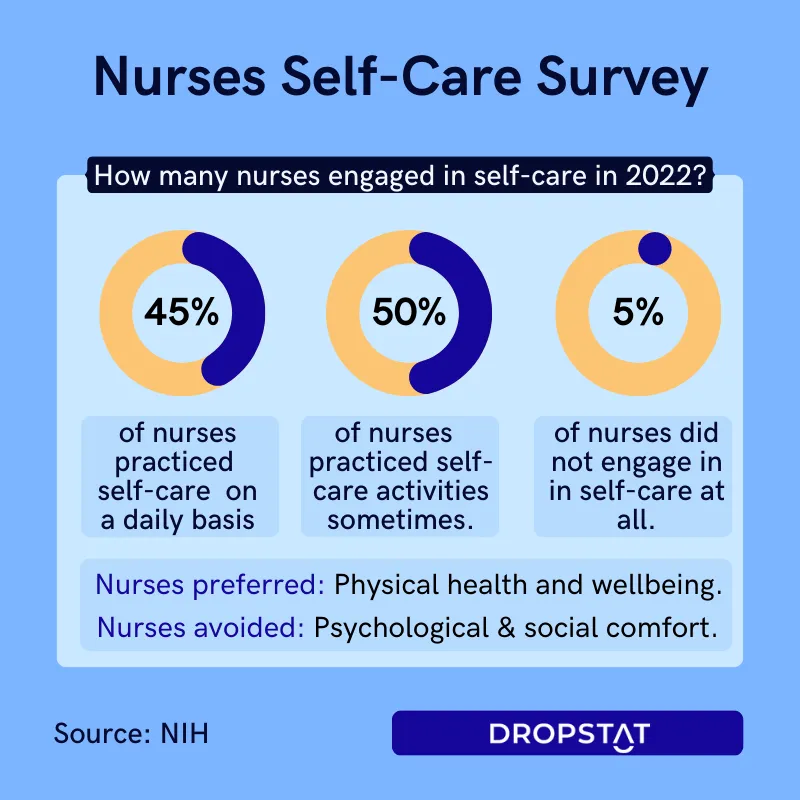
8 Key areas of self-care for nurses with examples
Dr. Swarbrick developed the “8 Dimensions” model, describing wellness. Swarbrick’s dimensions are: environmental, emotional/mental, financial, intellectual, occupational, physical, social, and spiritual. Let’s look at these as they relate to healthcare managers encouraging or allowing nurse employees to practice self-care.
Environmental self-care
Where possible, allow elements that give pleasure and strength to nurses. Many people enjoy seeing aspects of the ‘real world’ in their work environment.
For example:
- Include live, growing plants or aquariums
- Display art that inspires or adds humor
- Choose colors that calm for walls and furniture
Emotional self-care
Nurses enjoy their patients’ recoveries and successes but may struggle to digest bitter developments in patients or the work environment. Encourage processing of challenging emotions and boosting of positive ones.
For example:
- Emphasize nurses’ successes
- Ensure managers have an open-door policy if nurses wish to share
- Reward nurses with ‘smile bonuses’ for applying cheery and healthy attitudes
Mental self-care
Mental self-care takes place when nurses expand their knowledge in areas not connected to work directly. This builds self-esteem and confidence.
For example:
- Reading about nature
- Playing sudoku and other games and coloring in mandalas can build mental acuity and help nurses relax
- Discourage nurses from working through break times
Financial self-care
Financial self-care means taking care of one’s financial needs. Having enough money coming in, being able to save, and having one’s papers in order for regulatory reasons.
For example:
- Encourage nurses to be organized with keeping payslips and other financial information
- Discuss giving help with paying off debts for studies and qualifying
- Partner with a bank to offer nurses saving plans/pensions
Occupational (Professional) self-care
Building nurses’ professional self-care will help them feel more accomplished – and potentially fill the organization’s talent pipeline.
For example:
- Encourage nurses to complete courses
- Signing up for nurse-oriented printed or online magazines
- Recommend end-of-shift self-assessment
Physical self-care
Physical care for the body, posture, and good circulation requires 2.5 hours of exercise a week.
For example:
- Walking for enjoyment
- Brain breaks – get blood and oxygen to the brain with activities that shift brain focus
- Options for healthy meal choices, making self-care easier
Social self-care
Encouraging social health among nurses, including the social aspect of a nurse’s life, is a proven strategy for self-care.
For example:
- Support the use of an internal nurses’ chat and gratitude feed where nurses can thank each other
- Provide an inviting breakroom
- Where possible, allow self-scheduling for nurses to allow time off to recharge
Spiritual self-care
Spirituality can be religious in nature or an attachment to religious values; this means supporting a person’s search for meaning, purpose or truth, hope, love, connection, and of course, spiritual acts. Often these lead to consolation and healing.
For example:
- Encourage the practice of mindfulness and prayer
- Listening to music can console and influence perspective
- Meditation through yoga or meditative walking
Encourage nurses to develop a self-care plan that includes aspects of these 8 dimensions and to keep to it. Your facility will benefit from happier, healthier nurses who are more productive and engaged. Better quality patient care follows when a healthcare facility has strong, built-up staff.
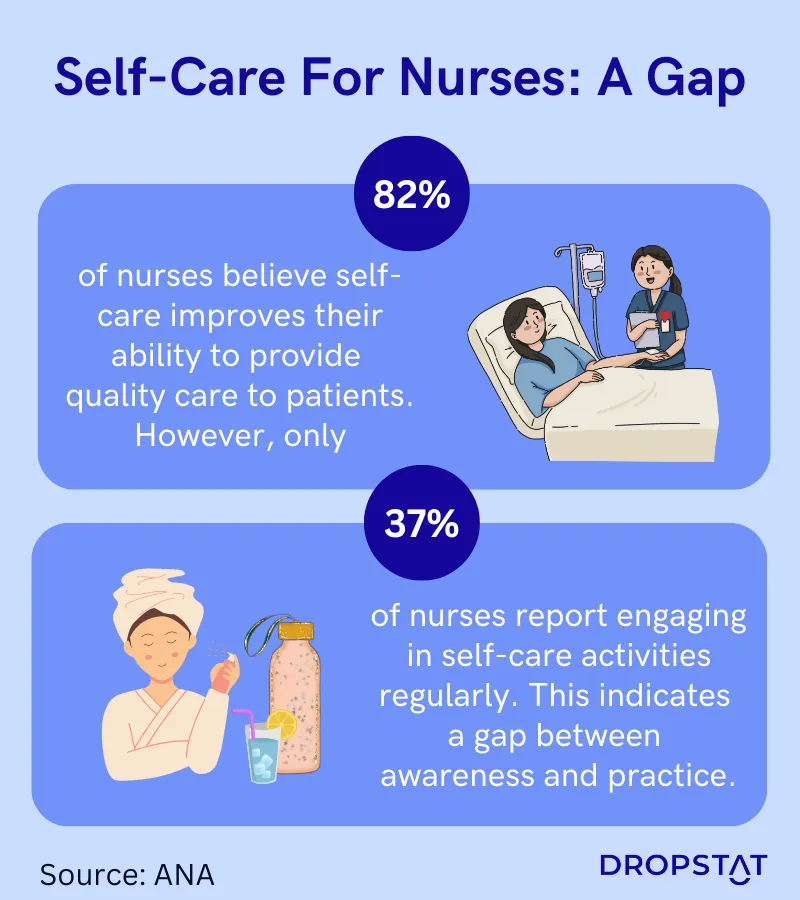
Nurse self-care: practical self-care strategies for nurses
Implementing self-care strategies for nurses and activities can significantly contribute to nurse job satisfaction and overall well-being. Let’s look at some ways of practicing self-care for nurses that nurses themselves can incorporate into their personal and professional lives
Nurse self-care at work
Dorothea Orem’s Self-Care Deficit Theory addresses the self-care needs of individuals. Nurses often assist in meeting those needs when individuals are unable to do so independently. While nurses care for patients on a continual basis, they must also practice self-care on themselves using the tools they already possess.
Some actions nurses can take to practice self-care at work are:
- Take short breaks to stretch, breathe, and refocus.
- Practice mindfulness exercises. Many nurses recommend deep breathing or meditation.
- Create a positive physical environment where possible by incorporating elements of relaxation, such as pictures of loved ones, plants, or soothing colors in the breakroom or workstation.
- Take advantage of support networks to accept help and engage in giving support through peer mentoring or precepting a new nurse.
Nurse self-care beyond the workplace
A vast majority of nurses (93%) surveyed during COVID did practice some self-care, but only 45% had a daily self-care plan.
Some examples of self-care activities for nurses that many nurses practice include:
- Nurture personal interests and hobbies outside of work.
- Engage in regular exercise and prioritize physical fitness.
- Embrace relaxation techniques such as yoga, tai chi, or guided imagery.
- Maintain a healthy diet and prioritize nutritious meals.
- Get sufficient sleep and establish a consistent sleep routine.
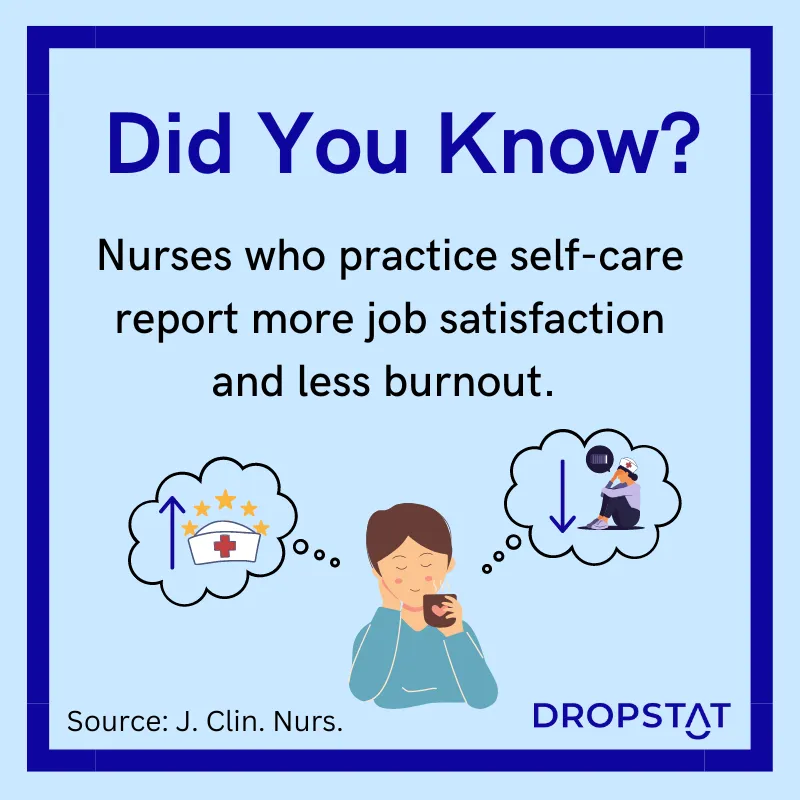
How healthcare leaders can promote a culture of self-care
Here are some practical ideas for promoting a culture of self-care for nurses within healthcare organizations
- Offer education in self-care techniques and training programs to increase nurses’ awareness of the importance of self-care and provide practical tools for nurses.
- Provide access to counseling services, mental health resources, and revitalization programs.
- Celebrate and acknowledge nurses’ self-care achievements, recognizing their efforts in prioritizing their well-being.
- Give self-care gifts to nurses, including items that make nurses feel valuable to the organization, such as soap gift packs and vouchers for massages and eating out.
- Offer self-care packages for nurses with handouts describing tried and tested self-care tips for nurses, and distribute a reading list of books about nurse self-care strategies.
- Promote the practice of nurses taking the time to sit down and have a meal during their shift.
- Make an organizational decision to ensure adequate and organized staffing by using a staffing app such as Dropstat to give nurses mental space for self-care.
Implementing these strategies will encourage a culture of self-care within healthcare organizations. Through this, CEOs can make a significant impact on the way nurses respond to the need for personal self-care, and the facility will benefit overall by empowering nurses with a secondary effect of enhancing patient care and satisfaction.
Identifying barriers to nurse self-care
While self-care holds immense value, several barriers commonly hinder its practice among nurses. These barriers need to be addressed to create an environment that supports and encourages a healthy nurse work-life balance. Understanding the importance of self-care for nurses and why self-care is often neglected can help remedy the deficit.
Overwhelming workload
One significant barrier to nurses’ self-care is the demanding nature of nursing workloads and time constraints. Nurses often find themselves overwhelmed by their responsibilities, leaving little time for self-care activities. To overcome this barrier, nurse education should include the teaching of strategies for managing work time effectively. Within the demands of the profession, prioritizing tasks, delegating when possible, and setting boundaries can create space for self-care.
Lack of support
A second barrier is the lack of resources and support for self-care within healthcare organizations. Healthcare leaders and CEOs can play a vital role in facilitating self-care. However, they often prioritize pressing matters such as regulatory issues, financial challenges, and equipment problems, leaving limited time and resources to address the critical need for nurse care and support.
Psychological barriers
Emotional and psychological challenges also pose barriers to self-care for nurses. Nurses can experience significant psychological distress when confronted with the suffering of patients or when dealing with distraught family members. This leads to emotional overwhelm, and nurses need external help to conduct effective debriefing and coping strategies to process and navigate these challenging emotions.
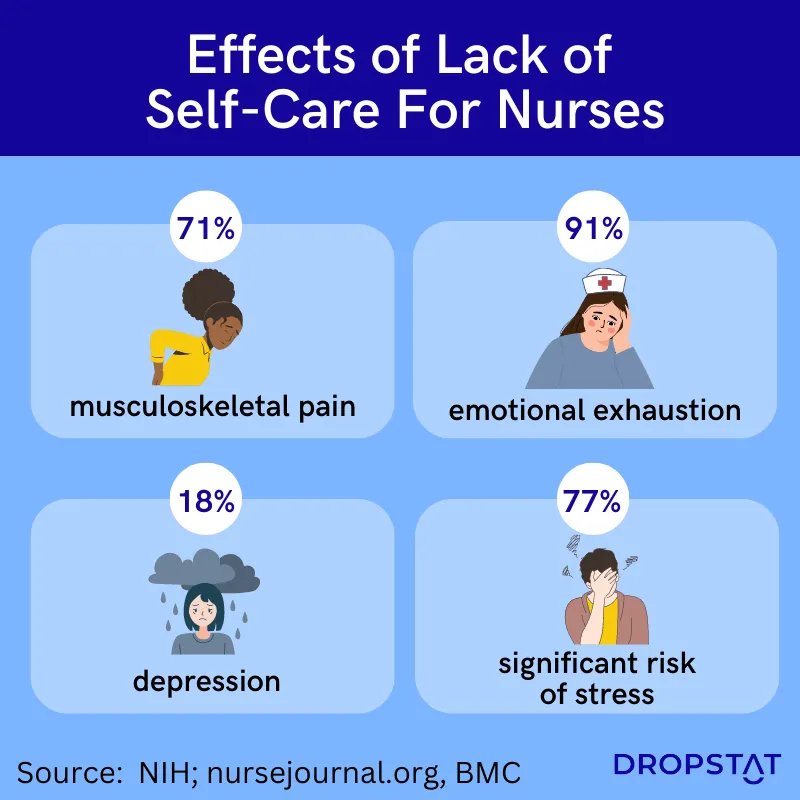
How Dropstat can help promote self-care for nurses
Dropstat, an AI-powered staffing app built for thriving healthcare facilities, can help create a caring, supportive work environment that fosters compassion, nurse well-being, and healthy resilience.
Dropstat’s advanced scheduling tools allow the scheduler to integrate nurses’ shift preferences into the scheduling platform to create schedules that best align with nurses’ needs while maintaining a fully staffed team for every unit in every shift. Dropstat facilitates instant communication between the scheduler and members of staff.
Dropstat also offers wellness resources by allowing nurses to join securely encrypted peer groups or to debrief healthily by talking to a therapist with confidentiality, which helps promote self-care.
Schedule a demo to learn how Dropstat can help your facility foster self-care for nurses.
